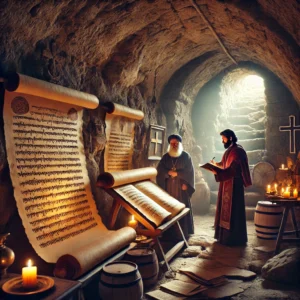Damascus, Syria — Deep within the rugged mountains of Syria, archaeologists and local clergy have made a groundbreaking discovery in a 6th-century monastery. Hidden behind a stone wall in an ancient prayer chamber, a trove of manuscripts written in Syriac has come to light. These manuscripts, dating back to the early centuries of Christianity, contain invaluable theological writings, early translations of the New Testament, and intricate illustrations.
The manuscripts are preserved remarkably well due to the monastery’s dry climate and the care of monks who safeguarded them during centuries of conflict. Scholars are particularly intrigued by a scroll offering commentary on the Gospel of Matthew, which includes interpretations not widely seen in other Christian traditions.
“This discovery opens a window into the spiritual and intellectual lives of early Christians in the Middle East,” said Dr. Amal Habib, the project’s lead archaeologist. “It also highlights the role of monasteries as centers of learning and preservation during tumultuous times.”

Beyond the manuscripts, researchers uncovered artifacts such as ancient pottery, crosses, and oil lamps. The site is being carefully documented and will likely become a pilgrimage destination for Christians and history enthusiasts worldwide.

